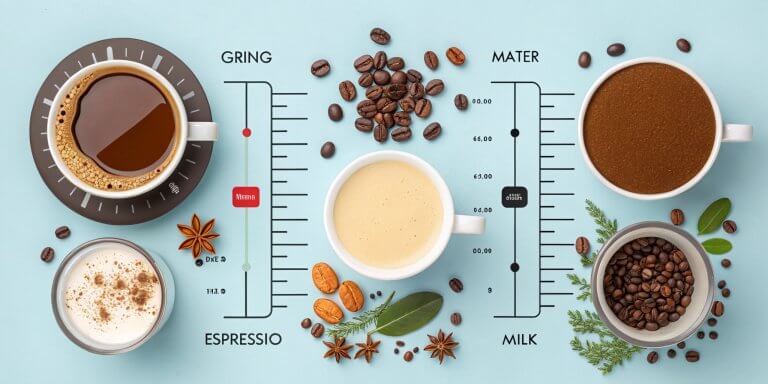
Are you intrigued by the idea of savoring black coffee but find yourself hesitant? Maybe you’ve always added cream and sugar or think black coffee is too bitter to enjoy. It’s a common perception that needs a bit of rethinking. To provide a balanced view, let’s address some common misconceptions about black coffee.
This blog post is not just a guide; it’s an exciting journey to appreciate how you enjoy black coffee. We’ll explore everything from selecting the right beans and mastering the best brewing techniques to adjusting your palate for a delightful experience. Plus, we’ll uncover the health benefits and cost savings of embracing black coffee. If you are thinking about how you enjoy black coffee, this is the right place to start your thrilling journey.
Our primary goal is to help you discover the pleasure and satisfaction of drinking black coffee.
What is Blak coffee?
So, what is black coffee? In the simplest terms, it’s coffee brewed with just water. That’s it! No milk, no cream, no sugar, or any other additions. It’s coffee in its purest form.
Drinking it black lets you experience the unadulterated flavors of the coffee bean. You get to taste all the nuances that additives might otherwise mask. The taste of black coffee can vary quite a bit depending on a few things: the type of bean, the roast level, and the brewing method.
There are also different types of black coffee to explore, such as espresso (a concentrated shot), Americano (espresso diluted with hot water), and even Turkish coffee (finely ground coffee simmered in water). Each offers a unique way to appreciate how you enjoy black coffee!
While there are numerous benefits to drinking black coffee, it’s essential to consider the potential downsides. Let’s explore both the pros and cons of this popular beverage.
Why should you even bother learning to enjoy black coffee? There are quite a few compelling reasons!
First, you get an enhanced flavor experience. Black coffee allows you to fully appreciate the nuances of the bean’s origin, processing method, and roast level. Additives like milk and sugar can mask those subtle flavor notes, preventing you from truly experiencing what the coffee offers.
Plus, there are some great health benefits. Black coffee is virtually calorie-free and contains no added sugar or fat. It’s also a rich source of antioxidants, and studies suggest it can improve focus, protect your liver, and reduce the risk of diseases like diabetes and Alzheimer’s.
Let’s not forget about the cost savings. Consider how much you spend on milk, sugar, and flavored syrups. Eliminating those additives can lead to significant savings over time.
Finally, brewing black coffee is often simpler than you might think. You need less equipment and fewer steps than making fancy lattes or cappuccinos. Once you get used to it, you’ll discover a wide range of flavor profiles from different coffee origins and roasts, expanding your palate and appreciation of coffee. Learning how to enjoy black coffee can be a rewarding journey, and you’ll be surprised at how capable you are of mastering it!
Selecting the Right Beans to Enjoy Black Coffee
Alright, let’s talk beans! If you want to know how you enjoy black coffee, it all starts with selecting the right coffee beans. Trust me, it makes a world of difference.
For the best experience, aim for high-quality, single-origin beans. These beans showcase the unique terroir and processing methods of the region or farm where they are grown.
Next up is the roast level. This is super important!
Also, think about where your beans come from. Different origins offer different flavor profiles:
The processing method matters too:
And finally, freshness is key! Always look for beans with a “roasted on” date.
Brewing Methods To Relish Black Coffee
The brewing method can seriously impact the taste, so let’s dive in!
First, grind size matters. Here’s a quick guide:
Getting the water temperature right is also crucial. You want it between 195°F and 205°F (90°C and 96°C). Too hot, and you risk scorching the coffee grounds. Too cool, and you’ll under-extract the coffee, leaving it weak.
Now, let’s look at different methods:
- Pour Over (Hario V60, Chemex, Kalita Wave): Gives you precise control for a clean cup.
- French Press: Results in a full-bodied cup.
- Aeropress: Super versatile, you can get a concentrated or smoother cup.
- Automatic Drip: Convenient, but look for SCA-certified models.
- Cold Brew: Produces a smooth, low-acid concentrate.
And one more thing: always use filtered water! Tap water can mess with the taste. The quality of water you use can significantly affect the flavor of your coffee, so it’s essential to pay attention to this often overlooked factor.
Experimenting with different brewing methods is key to discovering how you enjoy black coffee the most. Let’s delve into the world of coffee brewing and explore the unique characteristics of each technique. We’ll also discuss some common mistakes to avoid, ensuring you get the best out of your black coffee.
Training Your Taste Buds
The key is to start gradually. Don’t go cold turkey unless you’re feeling courageous. Instead, slowly reduce the amount of milk and sugar. Make incremental reductions – decrease the additives a little more every few days. This gives your taste buds time to adjust.
As you reduce additives, it’s crucial to focus on quality. Pay closer attention to the quality of your coffee. Choose high-quality beans and brew them carefully. This discerning approach will enhance your coffee experience and make you a knowledgeable coffee enthusiast, capable of appreciating the finer nuances of black coffee.
Experiment with different brewing methods. Various methods can highlight multiple aspects of the coffee’s flavor profile. Try a pour-over, French press, or Aeropress to see what you like.
Don’t be afraid to try different origins and roasts. Explore coffees from various regions and roast levels to discover your preferred flavors.
To help you keep track of your preferences, consider keeping a coffee journal to document your tasting experiences, noting your favorite flavors and brewing methods.
Also, remember that certain foods can complement the flavors of black coffee. Try pairing your coffee with a piece of dark chocolate or a pastry with subtle sweetness.
Most importantly, be patient. Adjusting your palate takes time, so don’t get discouraged if you don’t love black coffee immediately.
If you’re struggling with the intensity, consider black coffee alternatives. Explore options like Americanos or Long Blacks, which offer a diluted black coffee experience.
Finally, practice mindful tasting. Pay attention to the coffee’s aroma, flavor, body, and aftertaste.
Common Mistakes to Avoid for Black Coffee Drinkers
So you’re on your journey to discovering how you enjoy black coffee, but are finding it a little tricky? It might be because of some common mistakes! Here’s what to watch out for:
- Using Stale Coffee Beans: Coffee beans lose their freshness and flavor quickly after roasting. Always use freshly roasted beans.
- Incorrect Water Temperature: The flavors will not be extracted correctly if the water is too hot or cold.
- Improper Grind Size: Using the wrong grind size for your brewing method can lead to under- or over-extraction—a medium grind works for drip coffee makers, finer for espresso, and coarser for French press.
- Dirty Equipment: Coffee residue and oils can build up and mess with the taste. Make sure to clean your equipment regularly.
- Rushing the Bloom: Don’t rush the bloom (pre-infusion), because it’s key for optimal flavor extraction.
- Using Poor Quality Water: The quality of your water can impact the taste of your coffee. Use filtered water to avoid unwanted flavors.
Avoiding these mistakes will help you understand how you enjoy black coffee to the fullest!
Enhance Your Black Coffee Tasting Experience
First, choose the right environment: Find a quiet place without distractions so you can focus.
Be sure to use a clean mug to avoid any lingering flavors.
When ready, take a small sip and let the coffee coat your tongue. This helps you pick up on all the subtle notes.
Before you even sip, savor the aroma. Your sense of smell plays a significant role in how you perceive flavor.
As you taste, identify the flavors. Are there fruity, nutty, or chocolatey qualities?
Also, consider the temperature. Some flavors become more noticeable as the coffee cools.
Don’t be afraid to experiment with different bean types, roast levels, and brewing methods to find what you love.
You can pair your coffee with chocolate, pastries, or nutty snacks to bring out different flavors.
For a deeper dive, join a coffee tasting event to learn from experts and connect with other coffee lovers.
Health Perks in Black Coffee
Beyond the taste, understanding how you enjoy black coffee also involves appreciating its health benefits! Black coffee is a low-calorie option, containing under five calories per cup. It’s also rich in antioxidants, which combat inflammation and may reduce the risk of chronic diseases. The caffeine in black coffee stimulates the central nervous system, enhancing mental alertness and improving focus. Moreover, it can support weight loss by boosting metabolism, especially with a balanced diet and exercise. Research even suggests that regular consumption may lower the risk of liver diseases, including cirrhosis and fatty liver. So, learning to appreciate black coffee isn’t just about taste; it’s about wellness too!
Conclusion
In conclusion, learning to enjoy black coffee is a rewarding journey with unique flavors and health benefits. You’ll discover a world of taste by experimenting with different beans and brewing methods. From its low-calorie content to its rich antioxidants, black coffee offers a path to wellness and a deeper appreciation for coffee’s complexity. Share your experiences and preferences as you explore this exciting world!






